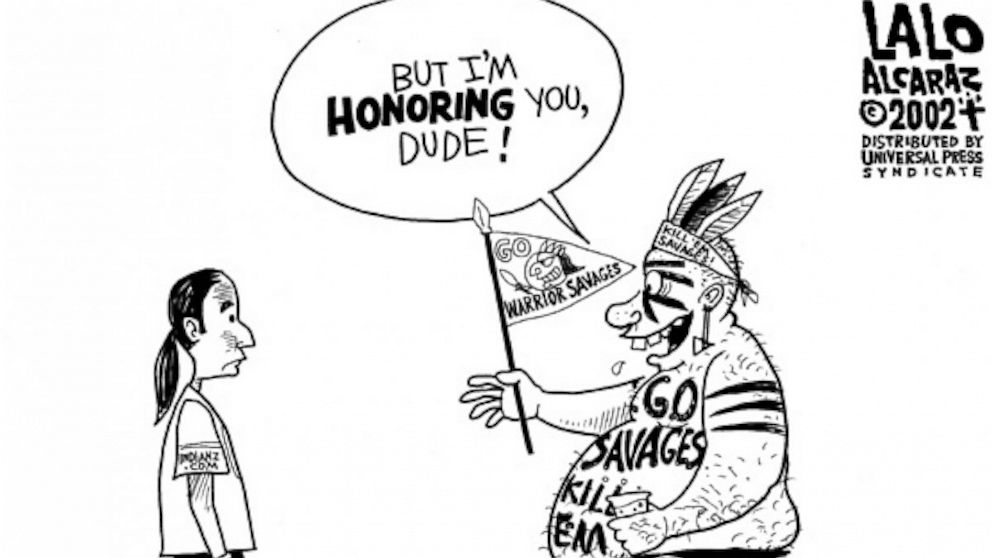Appropriating Native American Imagery Honors No One but the Prejudice
Native American community attempts to change Redskins team name and mascot.

Sept. 18, 2013— -- I was a sophomore in high school, about 15 years old, when a rather hostile group of cheerleaders and football players cornered me, yelling, as I sat on a bench in the quad between classes. “Don’t you have school pride?" a cheerleader shouted. “You should feel proud! We’re honoring your people!" one football player hollered.
I was the only Native American (as far as I knew) at Woodbridge High School in Irvine, California. Irvine is a planned city in Southern California and one of the safest cities in the United States, but I didn’t feel safe that day.
I had met one-on-one with the principal, my guidance counsellor, a few teachers and several students to share my negative feelings toward our school’s mascot – an anonymous Native American “warrior" with long, flowing, jet-black hair, a large nose and huge muscles. I guess I thought if I made it known that I felt appropriating Native American imagery was offensive, they’d stop. I was outnumbered, though, and my personal feelings didn’t matter. But that’s the thing: As Native people, especially as urban Natives (what we Indigenous people living in urban centers call ourselves), we are almost always outnumbered. So, we go unnoticed and unheard. Our opinions never really matter.
Students wore goofy, cartoonish costumes of our mascot (and his equally tasteless “warrior princess" girlfriend) at pep rallies and games. The pair would dance and do occasional acrobatic moves, as they made their grand entrance to the deafening sounds of the school’s marching band, playing the quintessential Hollywood fight song that, for me at least, conjures up images of a scene from an old Western movie: “savage" Indians on horseback approaching a village of settlers...Uh-oh, there must be trouble.
Spectators always stood for the song and sliced the air with their arms. I’m sure you’ve seen it, or done it yourself -- the tomahawk chop. Every now and then you’d hear a distant war whoop. And if you were lucky, you’d get to see an imitation of war paint on game day.
I didn't understand how face paint purchased from a drug store and a faux headdress made of brown construction paper and dyed arts & crafts feathers was respect. How does celebrating Native people with war imagery honor a living people? Well, it doesn’t. It saddens me that this is all we are to you: people who speak in broken English (“How.") and the only thing we do is engage in battle with bows, arrows and tomahawks. Oh, and perform an occasional rain dance when we hear a repetitive drum beat.
Racial stereotyping, inaccurate racial portrayals, and cultural appropriation do not honor a living, breathing people. Plain and simple, cultural appropriation -- especially when members of the culture protest the appropriation -- is not respectful.
It’s beyond me why people are okay with this. With any other culture, people would be up in arms.
Maybe the Woodbridge High School community and others don’t understand how this type of bullying -- yes, it’s bullying -- affects young people. Native American and Alaskan Native youth have the highest rates of suicide-related fatalities, according to the Centers for Disease Control and Prevention. The lack of positive images of Native Americans doesn’t help self-esteem.
I’m not the only one who thinks that racists mascots don’t belong in sports. Just ask a psychologist.
The American Psychology Association (APA) recommends retiring American Indian mascots altogether. First of all, the organization found that the stereotypical images were harmful for the development and self-esteem of American Indian students. That wasn’t all. The portrayals had a negative effect on all students.
The problem, according to the APA, is that American Indian mascots are “undermining the educational experiences of members of all communities-especially those who have had little or no contact with Indigenous peoples." And, it “establishes an unwelcome and often times hostile learning environment for American Indian students that affirms negative images/stereotypes that are promoted in mainstream society."
One of the best films on the subject that I’ve seen is the documentary film In Whose Honor?. The film focuses on Charlene Teters (Spokane) and her campaign against “Chief Illiniwek," the mascot of University of Illinois. Other highly publicized Native American mascot battles are described here.
Unfortunately, this racial insensitivity extends beyond U.S. borders. Ian Campeau, an Ojibway father and member of the DJ group, A Tribe Called Red, has filed a human rights complaint with the Ontario Human Rights Tribunal against an amateur football club, the Nepean “Redskins," in hopes of eradicating the use of the term altogether. The team is based in Canada’s capital city, Ottawa, and uses a cartoon image of a red-faced Indian man with a large nose, a long, black braid and two feathers in his hair as their mascot.
“The players call each other ‘redskins’ on the field," said Campeau in a press release. “How are they going to differentiate the playing field from the school yard? What’s going to stop them from calling my daughter a redskin in the schoolyard? That’s as offensive as using the n-word."
If Campeau’s request is granted, the Human Rights Tribunal would order the National Capital Amateur Football Association to change the name and logo. His complaint also requests that the Tribunal draft a policy on the use of Indigenous imagery in sports, which could have an impact on teams of various levels that use the Redskins name in Canada.
The most in-your-face examples of racists mascots are in professional sports, including the football team of our nation’s capital, the Washington Redskins. The team’s owner, Dan Snyder, refuses to change the team’s name despite the obvious offensive nature of the imagery and name itself. Snyder has been quoted as saying, "We'll never change it. It's that simple. NEVER — you can use caps."




